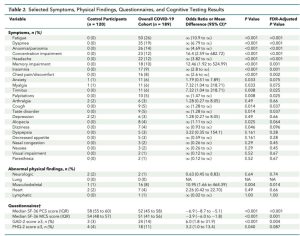‘Long Vax’ Confirmed? Researchers Begrudgingly Admit Connection Between ‘Long Covid’ Symptoms & Vaccines

Covid vaccine recipients are reporting a rare but growing phenomenon of adverse symptoms, which range from unusual blood clotting and heart inflammation to a more ambiguous set of symptoms similar to those of Long Covid, which has been dubbed “Long Vax” by some.
Although initially elusive and its connection to vaccination uncertain, there is growing acceptance of this phenomenon in the medical and scientific communities.
In a recent report for Science, researchers conceded that there are a growing number of patients who are complaining about the “Long Vax” ailments.
Harvard Medical School neurologist Anne Louise Oaklander told the publication, “You may wonder about one or two cases and attribute it to coincidence. But when you’ve seen dozens, it raises suspicion.”
Two medical conditions, small fiber neuropathy and postural orthostatic tachycardia syndrome (POTS), appear to share characteristics with this post-vaccination syndrome.
While regulatory bodies in the U.S. and Europe have not yet found any definitive links between COVID-19 vaccines and small fiber neuropathy or POTS, Peter Marks, director of the U.S. Food and Drug Administration’s Center for Biologics Evaluation and Research, maintains that it’s prudent to be open to the possibility of rare cases. Marks also emphasizes the need to avoid sensationalizing these possibilities and claims that the benefits of vaccines far outweigh any potential risks, while neglecting to specify risk profiles differ profoundly for patients according to age, obesity, and natural immunity.
Despite such ambiguities, German Minister of Health Karl Lauterbach admitted in March that symptoms similar to Long Covid following vaccination, though rare, are a real occurrence. He noted that his ministry was planning to fund research studies to investigate further.
Research indicates that these post-vaccination symptoms could be the result of an immune overreaction to the SARS-CoV-2 spike protein, which COVID-19 vaccines use to stimulate protective antibodies. Some theorize that rogue antibodies could bind to the angiotensin-converting enzyme 2 (ACE2) receptor, disrupting its signaling and possibly leading to the racing heart rates and blood pressure swings seen in POTS.
Some people seem to be susceptible to complications both post-infection and post-vaccination. Treatment approaches for POTS and small fiber neuropathy post-vaccination range from increasing salt and fluid intake and slowing down the heart rate with beta blockers, to more invasive procedures such as intravenous immunoglobulin or even plasma exchange.
Harvard Medical School professor Adam W. Gaffney reported on Long Covid symptoms in May 2022 and found that the reported symptoms were primarily psychological in nature and showed a weak correlation with neurologic, lung, musculoskeletal, heart and lymphatic biomarkers.

“On the other hand, numerous biomarkers showed no difference between those post-COVID and controls, including tests for”:
(1) general inflammation (e.g. CRP)
(2) autoimmunity (e.g. ANA)
(3) clotting abnormality (e.g. d-dimer)
(4) heart inflammation (e.g. troponin)
(5) Kidney function
(6) Liver function
(7) Blood levels
(8) Brain injury (neurofilament light chains)
“Next, they report lung function tests,” Gaffney goes on. “Again, no differences, unsurprising given that the post-COVID patients mostly did not have severe pneumonia which damages the lungs.”
A large population study published at the Journal of Clinical Medicine in 2022 found that the spike in myocarditis cases cannot be attributed to “Long Covid.” Thus, Long Covid is not suspected as the underlying cause of the increase in heart condition cases, and is not strongly linked to major organ system biomarkers that are commonly used to diagnose pathologies.
Though much remains to be understood about Long Vax, scientists say they are eager to further their research, understand the condition better, and find effective treatments.



